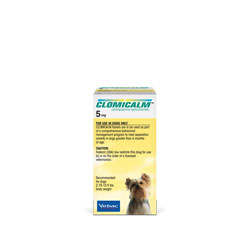Clomicalm Tablets
+ Save on each recurring order!
Veterinarian Prescription (Rx) Required
Free Shipping on Orders over $75
Low Price Match Guarantee
- A Safe Effective Plan To Treat SEPARATION ANXIETY
- CLOMICALM® (clomipramine hydrochloride) Tablets were the first medication approved for the treatment of separation anxiety in dogs.
Description
If you ignore the signs of separation anxiety, the disorder could get worse.
What are the signs of separation anxiety?
Dogs with this disorder are often well behaved when people are around, but when left alone, they become anxious, showing one or more of these signs: destruction (chewing, digging), inappropriate elimination (urinating, defecating), excessive salivation or vocalization (barking, whining). Some dogs exhibit signs when separated from the person or people to whom they are most attached even if other people are around.How do you know if your dog has separation anxiety?
If your dog suffers any of the signs of separation anxiety such as barking, inappropriate urination or defecation, or destruction when left alone, it could be because of separation anxiety. An ideal way to help find out is to videotape your dog when you are out. However, there are other disorders and illnesses with similar signs, so schedule a special consultation with your veterinarian if you think your dog has this problem.What's the best way to treat separation anxiety?
Now, there is a two-part plan that combines behavior training with a daily medication called CLOMICALM® (clomipramine hydrochloride). The CLOMICALM Plan is proven to be fast and effective in relieving the suffering and helping your dog return to a normal life. CLOMICALM Tablets have been proven safe in clinical and laboratory studies. They've been approved by the FDA,* which means they meet tough standards similar to those required for human medications. The following adverse reactions have been reported: lethargy/depression, elevation in liver enzymes, vomiting, diarrhea, and increased thirst. For full product information, see product label.Dosage and Administration
The recommended daily dose of Clomicalm Tablets is 2 to 4 mg/kg/day (0.9 - 1.8 mg/lb/day) (see dosing table below). Your veterinarian will instruct you to give the drug either once a day or divide the daily dose into 2 separate doses depending on your dog's response to the drug or tolerance to any side effects. Clomicalm Tablets may be given with a small amount of food in an attempt to reduce the incidence of vomiting that may be experienced by some dogs. If a dose is missed, the next dose should be administered (without doubling) at the next scheduled dosing time.| Dog Weight (lbs) | Clomicalm per Day | No. Tablets per Day | Tablet Strength |
| 2.75-5.5 | 5 mg | 1 | 5mg |
| 5.6-10.9 | 10mg | 2 | 5mg |
| 11-22 | 20mg | 1 | 20mg |
| 22.1-44 | 40mg | 1 | 40mg |
| 44.1-88 | 80mg | 1 | 80mg |
| 88.1-176 | 160mg | 2 | 80mg |
Your veterinarian may decrease the dose or discontinue treatment with Clomicalm Tablets depending on your dog's response to treatment. Continued behavior training is recommended, even after cessation of drug therapy.
Caution
Federal (USA) Law restricts this drug to use by or on the order of a licensed veterinarian.
Contraindications
Clomicalm Tablets are contraindicated in dogs with known hypersensitivity to clomipramine or related tricyclic antidepressants.
Clomicalm Tablets should not be used in male breeding dogs. Testicular hypoplasia was seen in dogs treated for 1 year at 12.5 times the maximum daily dose.
Clomicalm Tablets should not be given in combination, or within 14 days before or after treatment with a monoamine oxidase inhibitor [e.g. selegiline hydrochloride (L-deprenyl), amitraz].
Clomicalm Tablets are contraindicated for use in dogs with a history of seizures or concomitantly with drugs which lower the seizure threshold.
Human Warnings
Not for use in humans. Keep out of reach of children. In case of accidental ingestion seek medical attention immediately. In children, accidental ingestion should be regarded as serious. There is no specific antidote for clomipramine. Overdose in humans causes anticholinergic effects including effects on the central nervous (e.g., convulsions) and cardiovascular (e.g., arrhythmia, tachycardia) systems. People with known hypersensitivity to clomipramine should administer the product with caution.
Precautions
It is important that your dog be closely monitored by your veterinarian while on a treatment plan with Clomicalm Tablets and behavior training. You must inform your veterinarian of any current or future medications you are administering to your dog. The use of Clomicalm Tablets in conjunction with certain other drugs or when your dog has other illnesses may be contraindicated or increase the risks of adverse reactions.
It is important that you inform your veterinarian of any changes in your dog's environment including, but not limited to, a new family member, a new pet, a move to a new location, or a change in your existing daily schedule. Some changes may result in an altered response to therapy.
It is important to inform your veterinarian of any perceived changes in your dog's behavior, appetite, or overall health while administering any medication. Some dogs display a temporary lethargy with the first few days of Clomicalm treatment. In some cases, signs of separation anxiety, such as vocalization, may temporarily increase at the initiation of treatment. In an overdose situation, seek veterinary attention for your pet as soon as possible.
The safety and efficacy of Clomicalm Tablets have not been established in dogs less than 6 months of age or in pregnant or lactating female dogs. Clomicalm Tablets should not be used in breeding male dogs (see Contraindications). Clomicalm Tablets are not recommended for other behavior problems, such as aggression.
Efficacy
Clomicalm Tablets were tested in clinical trials involving client-owned dogs to determine effectiveness. Clomicalm Tablets, at 2 - 4 mg/kg/day (0.9 - 1.8 mg/pound/day) when used in conjunction with behavior training accelerated both the time to improvement and the final result of separation anxiety therapy compared to behavioral training alone.
Adverse Reactions
The following adverse reactions have been reported associated with administration of Clomicalm Tablets: lethargy/depression, vomiting, diarrhea, elevation in liver enzymes, convulsion(s), increased heart rate, decreased heart rate, increased thirst and confusion. Liver disease has occurred, especially in the presence of pre-existing conditions or with concurrent administration of drugs metabolized by the liver. In overdoses, signs such as vomiting, lethargy or depression, weakness and incoordination, dilated pupils, and vocalization may occur. Consult with your veterinarian if your dog experiences these or any other conditions. In case of accidental human ingestion or accidental overdose in dogs, call 1-888-545-5973.
Storage
Store in a dry place at controlled room temperature, between 59° and 77°F (15-25°C). Store unused tablets in the original closed container.
| RX required for this item. Click here for our full Prescription Policy and Form |
If you ignore the signs of separation anxiety, the disorder could get worse.
What are the signs of separation anxiety?
Dogs with this disorder are often well behaved when people are around, but when left alone, they become anxious, showing one or more of these signs: destruction (chewing, digging), inappropriate elimination (urinating, defecating), excessive salivation or vocalization (barking, whining). Some dogs exhibit signs when separated from the person or people to whom they are most attached even if other people are around.
How do you know if your dog has separation anxiety?
If your dog suffers any of the signs of separation anxiety such as barking, inappropriate urination or defecation, or destruction when left alone, it could be because of separation anxiety. An ideal way to help find out is to videotape your dog when you are out. However, there are other disorders and illnesses with similar signs, so schedule a special consultation with your veterinarian if you think your dog has this problem.
What's the best way to treat separation anxiety?
Now, there is a two-part plan that combines behavior training with a daily medication called CLOMICALM® (clomipramine hydrochloride). The CLOMICALM Plan is proven to be fast and effective in relieving the suffering and helping your dog return to a normal life. CLOMICALM Tablets have been proven safe in clinical and laboratory studies. They've been approved by the FDA,* which means they meet tough standards similar to those required for human medications. The following adverse reactions have been reported: lethargy/depression, elevation in liver enzymes, vomiting, diarrhea, and increased thirst. For full product information, see product label.
by Novartis







